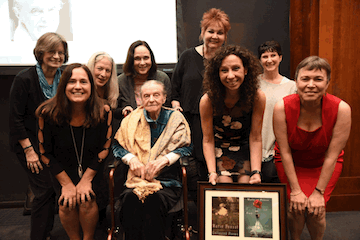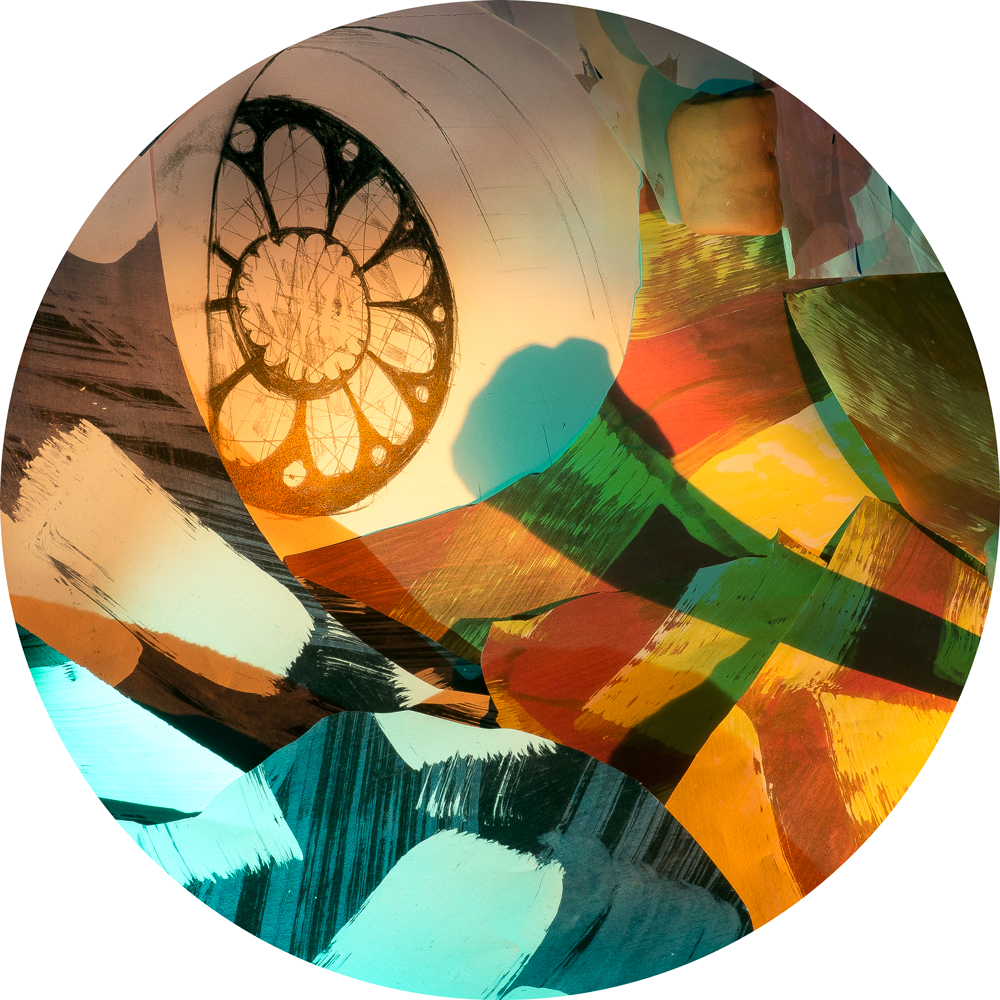Anna M. Evans
To Help Rot the Corpse
My father makes another gallows crack.
A scant two weeks ago he nearly died.
I think, what if he hadn't made it back?
And contemplate the tears I would have cried.
But, unlike me, I know he is prepared
to meet his maker and, of course, my mother,
while I'm the one who's selfish and too scared
to call my closest relative my brother.
My father laughs, delighted at his wit,
and in my deep relief I can be brave,
enjoy this respite fully, yet admit
"the paths of glory lead but to the grave."
I giggle too. Although the outlook's grim,
his words make light for me, and mine for him.
Urban Ghosts
I'm in the trendy bar in my hometown
converted from the former cinema
when they decided not to knock it down
but use the shell. It itches like a scar.
There was the screen, and there's the balcony
behind which lay the rows of seats for twos.
So many films I watched (or didn't see)
from there, as I was learning I could choose.
This town, like many, is a palimpsest.
My childhood stories cannot be rubbed out,
though newer screeds have overlaid the rest.
My readings of the past are tinged with doubt.
But here they're Technicolor and 3D—
Pretty in Pink, Top Gun, Flashdance, E.T.
|
|
 |
 |
| AUTHOR BIO |
| Anna M. Evans’ poems have appeared in the Harvard Review, Atlanta Review, Rattle, American Arts Quarterly, and 32 Poems. She gained her MFA from Bennington College, and is the Editor of the Raintown Review. Recipient of Fellowships from the MacDowell Artists' Colony and the Virginia Center for the Creative Arts, and winner of the 2012 Rattle Poetry Prize Readers' Choice Award, she currently teaches at West Windsor Art Center and Rowan College at Burlington County. Her new collection, Under Dark Waters: Surviving the Titanic, is forthcoming from Able Muse Press, and her sonnet collection, Sisters & Courtesans, is available from White Violet Press. She blogs at annamevans.com/wordpress.
|
|
| POETRY CONTRIBUTORS |
 Michelle Blake Michelle Blake
 Erica Charis-Molling Erica Charis-Molling
 Kay Cosgrove (Featured Poet) Kay Cosgrove (Featured Poet)
 Anna M. Evans Anna M. Evans
 Nicole Caruso Garcia Nicole Caruso Garcia
 Kelsey Ann Kerr Kelsey Ann Kerr
 Jeanne Larsen Jeanne Larsen
 Susan McLean Susan McLean
 Claudia Monpere Claudia Monpere
 Diane Moomey Diane Moomey
 Stephanie Noble Stephanie Noble
 Suzanne Noguere Suzanne Noguere
 Linda Parsons Linda Parsons
 Samantha Pious Samantha Pious
 Barbara Quick Barbara Quick
 Leslie Schultz Leslie Schultz
 Sofia Starnes Sofia Starnes
 Myrna Stone Myrna Stone
 Katherine Barrett Swett Katherine Barrett Swett
 Marly Youmans Marly Youmans
|
|
|
 |
 |
The most recent addition to The Mezzo Cammin Women Poets Timeline is Rosa Newmarch by Jean L. Kreiling.
Marie Ponsot was presented with a Lifetime Achievement Award at the Celebration of the Timeline reaching 75 essays, Lincoln Center, Fordham University (Sponsored by Fordham's Curran Center) Friday, October 20th, 2017.
Charlotte Innes is the recipient of the 2018 Mezzo Cammin Scholarship to the Poetry by the Sea conference.
|
|
|
 |
|
|
|
 |
| Rachael Gorchov: Recently I completed a body of work that focused on the landscapes that define suburban office and industrial complexes, contemplating their subtle relationships with the history of landscape painting. When looking at these places I saw English landscape gardens – orchestrated nature that gave way to picturesque landscape painting. I documented my subjects onsite by drawing their reflections in a Claude Glass, a convex black mirror popularized as an observation device in the 18th century. This tool appealed to me for how its skews and bulges its reflection, making my work highly subjective from the start. I then constructed paintings in the studio based on these drawings. The three-dimensional nature of my paintings further emphasized the forced perspective in my initial drawings and required viewers to explore the paintings much like they might explore a physical space by moving around, crouching and craning their necks.
Irregular versions of geometric forms such as cubes, parabolic curves, cones and triangles comprised the dimensional shapes of these pieces and eventually gave way to my working nearly exclusively on concave surfaces and ‘rocks with cast shadows.’ I settled on these structures for a few reasons. When a viewer stands directly in front of the concave works, irregular half-spheres with the convex side attached to the wall, the paintings fill their peripheral vision for an immersive experience. The rocks and shadows, amorphous objects paired with adhesive-backed prints, are reminiscent of portals and geologic abrasions. They invite viewers to question if the dimensional form is emerging from or entering into another space. Like in other works, these pieces frame the physical space the artworks inhabit.
In 2016, I visited Europe where I recognized parallels between the interiors of Renaissance spaces and my own paintings, such as the power that foreshortening possesses in its ability to collapse and intensify space in cathedrals– similar to my Claude Glass works. This experience coincided with a visit to an exhibition in Vienna featuring renderings of synagogues that once stood in the city. This piqued an interest in contemplating architectural space in my work and prompted me to consider architectural language in my own Jewish cultural heritage. I then began a series of tondos, a Renaissance term for circular artworks, of European Jewish architecture.
Beginning with paintings and mixed-media, in these works I build a photographic image that engages the space wherever it is installed, becoming part of the architecture. I arrived at the tondo format through my own history of making non-rectangular paintings, and appreciate its relationship to reliefs and rose windows found in synagogues and cathedrals. In gathering source imagery, I rely heavily on documentation – photographs and engravings as most of these buildings have been destroyed. I contemplate the collective memory images of architectural space can reveal. In this spirit, this work depicts layered environments where scale, color and depth shift ambiguously, revealing experiential space.
I consistently begin works by looking at a particular subject because of an art historical or personal association, and then through a process of extracting details from their surroundings using an accumulation of marks, color and a tactility, I sacrifice specificity of form and place, ultimately revealing a specificity of experience as my subject.
|
|
|
|
|
|
 |
|
 |
|
|
|
|
